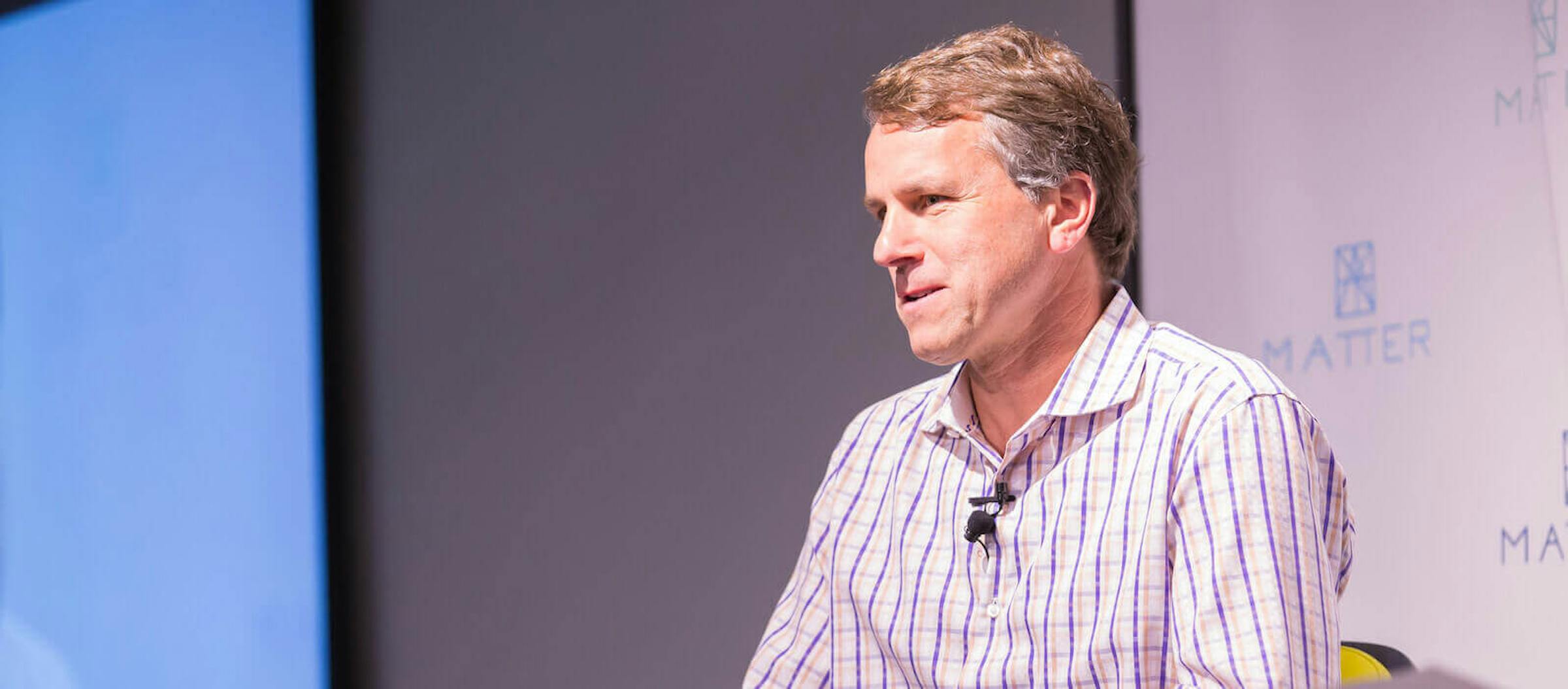Livongo’s Glen Tullman shares advice for building a business that can withstand any crisis
In the latest conversation in our member-exclusive Navigating COVID-19 webinar series, serial entrepreneur and investor Glen Tullman joined us for an interactive conversation with MATTER startups.
Glen is the founder and executive chairman of Livongo, managing partner at 7Wire Ventures and previously served as the CEO of Allscripts. Having built, run and scaled businesses across a range of industries, Glen knows what makes a sustainable business — one that can survive even in extraordinary circumstances.
“Survival has become a pattern in history,” Glen encouraged listeners as he kicked off the conversation. “We’re adaptive and we will get through this together.”
Glen also stressed that even though this conversation focused on surviving the effects of the COVID-19 crisis, businesses can, and should, ask themselves these questions at any point during their growth.
Here are our key takeaways. Responses have been edited slightly for length and clarity.
Ensure that you’re solving a critical problem.
“When thinking about your business, you have to consider a few things: What’s the challenge of your business? What’s the problem you’re solving? Is it important and critical? Is it something that is a long-term big problem or a short-term problem that can easily be solved?
“There are certain problems — healthcare and education are two of them — that will never be solved. The reason that they’ll never be solved is that the better you get at them, the higher the demand. So the more you educate people, the more they’ll want to know. The longer we keep people alive and healthy, the more challenges they’re going to have. We never had people who were 100 years old before — and now there are a whole set of new challenges we need to solve.”
Focus on what matters most to you.
“Focus on the parts of your business that matter the most for you — for myself, that was healthcare. Success for my business would mean that I was also making a difference.
“Second, I wanted to make a difference at scale, and there are many ways to do that. I chose to work with million dollar companies because my goal was to create a big impact. Lastly, I wanted to work with people who I really enjoy, who have the same values and work ethic as myself.
“I mention these things because when you face a challenge, you’ll have to have something that you can sink your teeth into. You have to think that, even if you had to struggle, you would still go to work because your work matters — you’re making an impact, changing the world and working with people who value the work just as much as you do.”
“You have to think that, even if you had to struggle, you would go to work because your work and what you’re doing matters.”
Consider the “Big Three.”
“At the core level, you want to build a sustainable business that can withstand [things like] the collapse of the internet, 9/11 and now a worldwide pandemic.
“When we are looking to invest in a business, we always ask ourselves, ‘Is this a good business?’ and ‘Is this a sustainable business?’ We look for, what I call, the Big Three.
“The first part of the Big Three is having a business that people love. It’s not enough for people to just like what you do — they have to love it. A merely likeable business is a replaceable one.
“The second part is that businesses today, more and more, need proven results. In healthcare, we often can’t prove that one business is better than the other — that’s what makes it difficult. As we gather more data, that will make healthcare more effective and more efficient.
“Last, but not least, in many other businesses we see the quality of products or services go up, and the cost go down — except in healthcare. In healthcare, as quality increases, so does the cost and our job is to flip that as a country.”
Clearly define — and don’t be afraid to redefine — the key aspects of your business.
“You have to understand the relationships that you’re creating and decipher whether it’s a customer or client type of relationship. I think of a customer as someone who comes in and does a transaction — maybe you know them and maybe you don’t. With clients, there’s a different feeling and a long term investment and relationship. Which kind of relationship are you going to have? Some businesses have turned customer relationships into client relationships. They’ve actually taken the time to get to know you and create a whole different kind of interaction.
“Is it a one-time consumable product you’re selling or more of a service? We’ve seen things we thought were products and see people turn them more into services, letting people subscribe and use what they need.
“Is your business recurring? Recurring revenue is great because it allows you to invest longer term and make different kinds of commitments to your clients.”
Understand how to use health data to create a better experience.
“It’s also important to understand network effects. At Livongo, we call this AI + AI and applied health signals — which is essentially applied data science. In the same way that Amazon can recommend books that you may like based on your behaviors, in healthcare, applied health signals can recommend how to make someone healthier.
“It’s really about the data and how you use it. The more data we get, the better we will get at predicting which interventions and treatments will work for someone. The more data that’s collected, the more applicable it will be. In healthcare, what works for an 18 year old woman will not work for a 72 year old man. Everyone needs a personalized response. More and more we will see the use of data in businesses change the interactions that we have.”
“The more data we get, the better we will get at predicting which interventions and treatments will work for someone. The more data that’s collected, the more applicable it will be.”
Livongo’s focus for their COVID-19 response: Trust, relationships, innovation
“First and foremost, you have to build trust for the future. We’ve seen some really great business responses relative to COVID-19. Others — luckily a lot fewer — have tried to take advantage of this by not giving refunds or extending payment terms and saying ‘Sorry, that’s just the way it is.’ These types of businesses missed an opportunity to build trust — not just with their clients and customers, but also their own employees.
“At this time and always, the core of your business should be to focus on the member or the client. Ask yourself, what can you do to relieve their stress? What Livongo did was rally our team and create a module that specifically dealt with COVID-19 — not just focused on the medical impact but also the emotional impact. We started with all of our customers, and then we made it available to anyone who wanted to use it. We did that simply because we wanted to be part of the solution.
“Also, as much as possible, be innovative and think ahead. We’ve seen businesses that may not be able to make their existing product right now, but they realized they could be able to produce face masks or ventilators with some restructuring. While we may not be able to dine out now, many of our restaurants, even five star restaurants, have given customers the opportunity to have that same dining experience in their own home. It may not be the same as being there, but they’ve simply shown a resilience that is very admirable.”
Think of this as a time for physical distancing, not social distancing.
“Even when the pandemic goes away, it’s still going to be with us. We are going to have to figure out how we can work and physically distance — not socially distance. Our job is going to be to make sure that we aren’t distancing socially and how to create new environments.”
“Even when the pandemic goes away, it’s still going to be with us. We are going to have to figure out how we can work and physically distance — not socially distance.”
“In a way, people are more connected than ever before and as a business, you have to try to take advantage of that.
“As a startup during this pandemic, you need to conserve as much cash as possible and be conscious about how you’re spending. Be smart about where you’re investing and evaluate where you need success right now.
“Most importantly, stay close to your members and clients and prioritize them. Your business should always start and end with your customers in mind. If you do that, you’re likely to survive.”
“Stay close to your members and clients and prioritize them. Your business should always start and end with your customers in mind.”
“These are the things that sustainable businesses do. Sustainable businesses actually accelerate when there is a problem or challenge, because at their core, they are a great business.”
Learn from more experts like Glen Tullman at one of our MATTER programs. On May 6, hear from Prashant Strivastava, CEO and co-founder of Evive, to learn about his steps to success during a crisis. Claim your ticket here.
If you’re a MATTER member interested in participating in more member-exclusive webinars like this one, contact info@matter.health. If you’re not a MATTER member yet and are interested in learning more about offerings like this, contact daniel@matterhealth.



